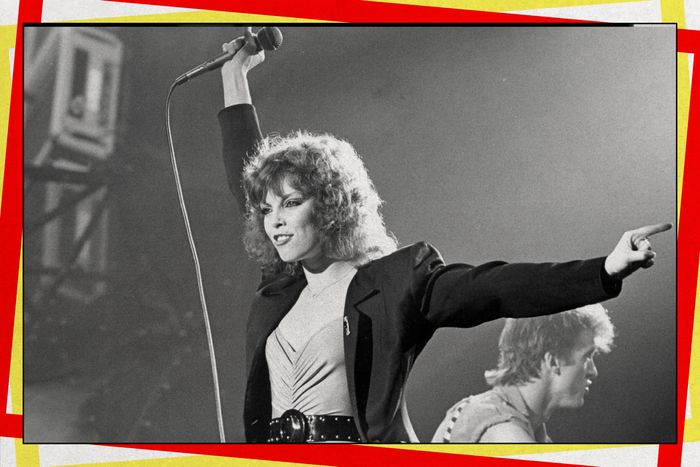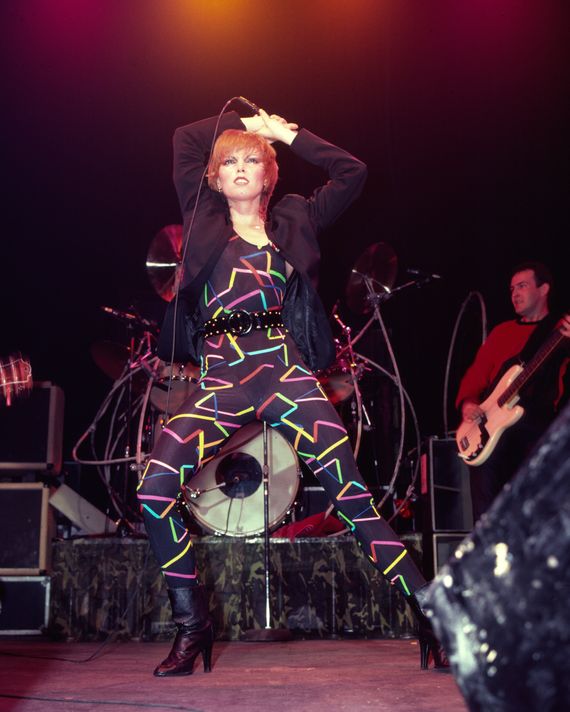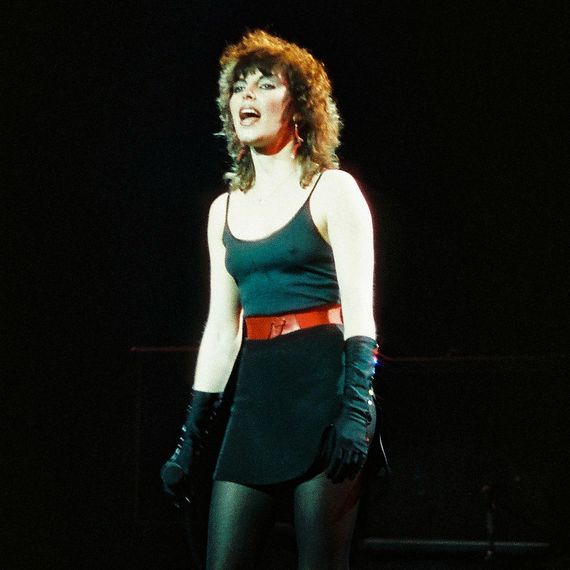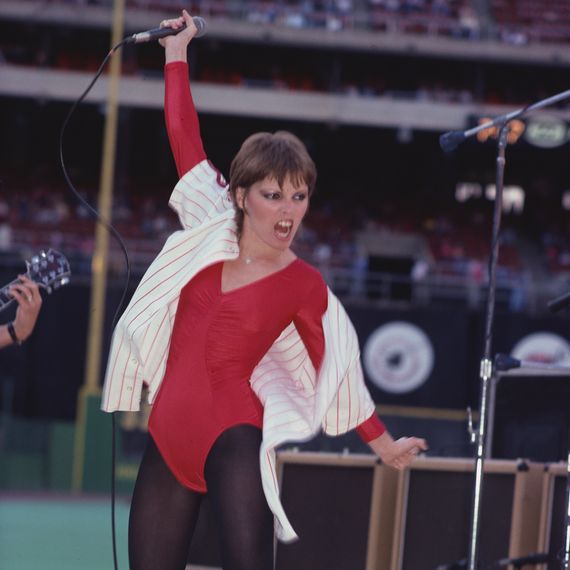
There’s a line — a quick but salient one — that Pat Benatar began her speech with at this year’s Rock and Roll Hall of Fame induction: “I want to say that all is forgiven.” But if you watched the HBO broadcast of the ceremony, you wouldn’t have been privy to these eight words. What gives? Well, it was cut along with a blazing performance of “All Fired Up” that preceded the remarks. When I told Benatar about this omission, having been present at that celebratory evening to worship her presence, she flashed a smile and couldn’t help but laugh. “Cowards!” she responded. “I was being a smart-ass. They made me wait 20 years.” I’d say this retort was Benatar in a nutshell, but she demolished that shell decades ago — stomping down the bullshit and the boys’ club with her leonine armor.
November was a prolific month for the singer-songwriter — even for someone whose career has been blessed with the beauty of longevity. (In fact, she hasn’t released an original album since 2003 despite having “hundreds of songs written,” she tells me.) In addition to her long-awaited Rock Hall induction, an honor she shared with her creative and romantic partner of over 40 years, Neil Giraldo, the duo premiered their first musical, Invincible, which reinterprets Romeo and Juliet through their work. “This is really important for everyone to know,” Benatar says. “This is an adaptation, and all of the songs have been reorchestrated into theatrical pieces. You’ll recognize them, but you won’t hear them in ways that you’re used to hearing them. It’s the most incredible experience to be in this room watching songs that you wrote about personal things or things that you observed about others, that you wrote from how you were feeling, your brain, your heart and watching them be now put into an entirely different story.”
Given that Benatar has influenced a generation of women with her feelings, brain, and heart, it’s no surprise that our conversation embodied that ethos.
Career-defining song
There are so many songs that have so much importance. “We Live for Love” is the first song that Spyder and I worked on together. He wrote it, and he says it’s always been for me. And I tell him, “Bullshit, you were still with your old girlfriend at that point.” But he swears it was for me. “Promises in the Dark” was the first song that we wrote together, so that’s very important. “Hell Is for Children” is monstrously important for the impact it had and the good it did. But I have to say, overall, “Heartbreaker” is the song, because it’s the culmination after three and a half years of trying to convince everybody of what I was talking about — they were all patting me on the head saying, “Yes, we understand,” but they didn’t understand me until I found Spyder, who was the person I was looking for.
I wanted a band, a partner. I didn’t want to be a solo female artist standing up in front of everybody. Like Robert Plant and Jimmy Page — I wanted that kind of relationship. I needed that strong, incredible guitar heft to be able to sing the way I was intending to sing. “Heartbreaker” was the song that initiated everything, because we played it together first. It was the first song we recorded, and it was the first song Spyder played. I knew it right then.
It was amazing on so many levels, because first of all, you wait your entire life to be in this moment of being signed, getting to record, and doing this for real. Not just recording in your basement but recording for a professional record label that’s going to actually go out on the radio. That added, really, to the clandestine thing of meeting Spyder. Besides knowing, musically, this was the person, he was romantically and emotionally the person for me. I was madly in love with him on so many levels from the first moment I saw him. So it was pretty spectacular to be in the room doing something that you’ve waited all your life to do with the person you love the most.
Most anthemic song
That’s kind of crazy, because when we’re making records, our style is anthemic. We always have at least four or five of those monsters on an album. Then we have our lovely ballads, which are sometimes anthemic. When I’m doing a live show, and I start stringing them together back to back to back, and I’m doing 14 anthemic songs together with only two ballads in between, then I realize how many there actually were. “Invincible” is massive, especially now because of the Me Too movement. I’ve been a liberated brat all my life. I’m the total female-empowerment girl. There’s a whole tone to that — they all know in the audience, and I project and I do it. I send it out to all my sisters always. They can pick for whatever reason how they want to be invincible. It’s an individual thing, but everybody goes right for it, because we’re all on the same page in that way. I’m out there bashing, and it’s what I love to do.
Most defiant song
“Invincible” and “Heartbreaker.” Those two are the most ferocious in attitude when they’re being performed. I mean, everything is heavy and always attacked with such ferocity. I always say it’s a good thing I’m not a politician, because they do that thing with their thumb where they don’t point. Because if I couldn’t point, I wouldn’t have a gig. You know what I mean? I’m the one looking at everybody all the time and pointing. I don’t think that you can learn or fabricate that type of defiance.
I’ve always been just a little absurd. Even when I was little. I lived on a block with mostly boys. I was raised in a sweet community that was really working class. Most of the kids I went to school with — their fathers were laborers. My father was a sheet-metal worker. My mother was a hairdresser, and their fathers were clammers. This was not even moderately well-to-do. Being on a block with all boys and enjoying so much of what they were doing rather than Barbies and nail polish. I was a nice girl growing up — polite and very studious. So the conflict was that, inside, I was the person who was like, when we were playing in the backyard, “You’re not going to get to tie me up unless I get to tie you up.” But outside, I was toeing the line. It was scary, because it was not really acceptable at the time. This was before the ’60s even started. When the women’s movement began, I gravitated to it immediately. I read everything that Betty Friedan and Gloria Steinem were writing. It finally sounded like something I could relate to. Now I didn’t exactly know how to implement this. I was studying opera at this point in my life, because that was the only thing I knew how to do. Somewhere along the line, I decided that was enough. I felt confident. I started to feel like it was getting more acceptable to be like this as a woman.
I got married when I was 19, because the boy I was dating in high school got drafted and I was afraid he was going to go to Vietnam and die. We moved to South Carolina and Virginia, since it was the Army, and people were such assholes. I was working as a bank teller, taking voice lessons, and going to school to support us, because he didn’t make any money. They had a floating staircase in the bank. I’m new, and I don’t know anything. They made me the head teller. I’m 20 years old, walking up and down the staircase every day to the break room upstairs. The loan officers, who were all men, sat under the open staircase. There was a dress code. Women weren’t allowed to wear pants. So every day, when you walked up and down the staircase, you had to hold your dress between your legs, because they’re looking up every time. So I got the girls together one day and I go, “This is bullshit. What the fuck? We’re going to tell them the dress code has to change or they’ve got to get a new staircase.” So I go down and talk to the bank manager and all the guys, and they say, “No.” So I said, “Really? Because you know what’s going to happen? I’m going to go to the Richmond Times-Dispatch and tell them about this conversation. Are you ready to do that?” So it started all that pushing and being pushed.
I got the idea that every time you did something like that, it empowers you. By the time it came to switching from doing theatrical music to this, I started to think, I need to be able to speak, and I need to be able to do what I’m feeling inside. This is why I did this. I mean, I wasn’t thinking of a global plan. I was thinking of myself personally. The country was ready. Women were ready. I was ready. It was just kismet.
Song that features your most aggressive vocals
There are other songs that are subtly aggressive. I’m very political. I veiled this, because I don’t think that it serves any purpose for people to know exactly what I’m thinking. People should think on their own. But I have my veiled ways of putting things into songs. There’s a song called “Purgatory.” It’s about the Second World War when DDT was invented to help. It did a lot of great things. It weakened malaria and typhus. But when the war was over, they decided to keep using it through the bases in the U.S. Then they were using it in homes, then it went to agriculture. Four or five years into this, they realized it was actually causing harm to humans, water, animals, fish — all this kind of stuff. But they didn’t ban it until 1972. “Purgatory” isn’t aggressive in the sense that it’s loud and big, but the sentiment in it is. It says we will be the forgotten ones. They will shake their heads and pity us. We sacrifice our sons and daughters with the sweet taste of victory on our lips. It’s about winning the war, coming home, and still fucking it up. Everything I do always has something in it that’s pushing around some kind of ideal — even if it’s not a big, monster song.
With my aggressive stage presence, I was singing at Catch a Rising Star until I got signed. I went for an open-mic night in 1975, and I stayed until 1978. I would go up as many nights as I could, and I’d be the filler musical act between comedians. Robin Williams, Chevy Chase, John Belushi, and Billy Crystal were all there performing. I was working with songwriters trying to get a grip. I was doing really well, but something was still missing. It was Halloween, and we decided to go down to Café Figaro in the Village and get all dressed up. I’m a sci-fi lunatic. Sci-fi is my absolute favorite thing. There was this really terrible movie called Cat-Women of the Moon, and it was a grade-F movie. So bad. But the costumes were incredible. They wore black tights and what looked like leotards. And they had big catlike eye makeup and ray guns. That’s what I wore to go to Café Figaro. I won the costume contest. Then we went back up to Catch a Rising Star at three in the morning and performed in costume.



So I went up in this little leotard with black tights and short boots and big eye makeup. I always wore makeup but not like that. I sang the same songs that I’d performed for two years, and the audience went insane. I remember standing there going, What’s happening here? Is everyone drunk? Is it too late? So I did it again the next night toned down. I didn’t have the ray gun, but I kept the makeup and tights, and I wore something that had a little more fabric. The same thing happened. I did this for ten subsequent nights, and I thought, That’s it. I cracked it. The audience changed how they reacted. But I changed, because I was wearing a costume, and I became another persona, which was always part of who I was anyway. But now I had it on the outside. It looked like what it felt like. It looked like, Oh, she’s a nice girl up there singing. So then the other thing came out. I always call it “her” to this day. I call it “her,” because she’s my other person. She’s Pat Benatar, and I’m Pat Giraldo. It’s like being civil. It’s kind of fun.
Song that you’ve outgrown
There’s a few. It’s not because they’re not good. It’s because the lyrics seem pedestrian to me or they seem too juvenile. “Hit Me With Your Best Shot” is really difficult for me now. I just want to clarify this: I stopped performing it for multiple reasons. It’s too juvenile for me to sing. People get angry when I say this, but they’ve got to understand that you have to believe it. You have to mean it. So if something changes for you, I’m not going to pretend and sing the song just because everyone wants to hear it. I can’t do that. That’s just sacrilegious to me. I’m not saying I won’t find it again.
“Fire and Ice” is another one. I can’t sing, “You come on like a flame, and you turn a cold shoulder.” I mean, I just can’t say those words. “Hit Me With Your Best Shot” is a special case. It’s a fabulous song. Everyone loves it. The interpretation of it has changed for me because of what has happened with all the mass shootings. I have difficulty saying the words out loud, being a parent, knowing that someone is hearing me wantonly say, “Hit me with your best shot. Fire away,” if you’ve lost a child. I’m not equating this with gun violence. I know the song’s not about gun violence. Let’s not be stupid. But for me to physically have to say the words, “Hit me with your best shot. Fire away” — I can’t find the place to make that okay. Can I just take a year break while I sort this out?
Most empowering album
Obviously, the first one, In the Heat of the Night. You wait your whole life, and someone has finally given you the opportunity to do this. You’re so grateful, and you just can’t wait to begin. So when you’re doing that first record, everything is new. You don’t know what to be afraid of. You don’t know what the pitfalls are. You have no opinion. It’s so open and free. You can do anything you want, because you don’t know any better. The hardest record to make was probably the second one, Crimes of Passion. The sophomore curse, of course. Everyone’s making you crazy, but you’re not crazy. You’re completely confident. But everyone is putting shit in your head to make you crazy and putting all kinds of pressure on you from the outside.
Inside, you’re cool. All of your band members — you’re all good and writing songs. You’re all fine. Then they go back and forth, back and forth. Making music is just like any other art form. It’s a living thing. It needs to be influenced by everything that’s happening to you. You can’t be isolated from your life, from the world, from the things that are happening around you and do it correctly. You have to be participating in the universe. And sometimes, the universe goes fucking south. It’s like, shit happens. You’re just a person, for God’s sake. Things happen, and my whole thing is always to let it roll, because I want what all of us bring to the party. Good, bad, ugly — I don’t care. Happy. Fabulous. I want all of it.
The next album that was really impactful was True Love, because at that point, I’d had enough. It was around 1989. I was like, Enough! How many more years do we have to do this? I wasn’t planning on doing this for the rest of my life. We had children. We were completely morphing into a much broader, thoughtful, insightful, beautiful, and well-rounded life. It wasn’t just about music and rocking. I was becoming really disillusioned, and I wasn’t happy. So I talked to Spyder about how maybe we should … “Let’s just do this last record, then I’d like to take a really long break or possibly retire. Maybe I’ll go back to doing theater.” He said, “No, no, no, no, no. I’ve been wanting to do a jump blues record forever.” And I’m like, “What the fuck? Are you insane now?” But this is what we listen to in our house. This is inside my blood every day — blasting Sonny Boy Williamson and everybody all the time. So he convinced me to do it, and it was one of the best things we ever did. First of all, it was really fun. Second, it kick-started my enthusiasm again to go back in and start recording.
How many record executives you threw out of your house for being assholes
Several. The crazy thing was I was discovering how to do this on the outside, but they really helped me solidify that, because they were such assholes. Every day, it was an ongoing thing. I would be at a board meeting and just sold five million records. Think about it: You were their biggest-selling artist. You had all the power. You’d be in the meeting, and there would be one other woman in there. She would be publicity, and everybody else would be a dude. Spyder hated going to these things. So I always had to go, and I’d be in there, and they’d be talking to you about marketing for the next project and how many sales there were in Europe and all this stuff. So you realize that you have just made them gazillions of dollars. And you would sit there, and they would be talking about, say, the album art. Then someone inevitably would ask, “What are you going to wear?” I go, “What am I going to wear? What am I going to wear? Did anyone ask Mick Jagger what he was going to wear?” Then I would stand up and get ready to walk out, and everyone would be looking at my ass.
You can feel this burning on your back — their eyeballs. I would turn around, and they were all looking at my ass. I’d be like, “Are you fucking kidding me?” So this was great ammunition. I was so crazy. “You Better Run” was one of the first videos played on MTV. The network came to us with the pitch. It was very exciting, but the boys were like, “We’re not doing that. We’re not.” And I’m like, “Come on, this is a great way to get the songs in another venue. We should do this.” Because at that point, the only way anyone ever saw you was live. That was it. Being the entrepreneurial human I am, this made sense to me. This was marketing. I didn’t see anything wrong with this as long as we did what we did.
So they brought us to this warehouse in New York. Nobody knows what they’re doing. All we know is we’re going to film a live performance of “You Better Run.” The director is a film director. We’re there for what seems like 52 hours, then the guy brings in this giant wind machine to blow my hair around. And he says to me, “I’m going to turn the wind machine on, so when we do this next thing, I want you to go.” I look at Spyder, and I say, “Excuse me? I don’t ‘go.’ I’m not a runway model. I’m not going to ‘go.’ What are you talking about?” Out with the wind machine.
So the attitude in “You Better Run” came right after that conversation. That’s the take. Because I was like, “What the fuck? I’m going to be prancing around like I was a runway model.” No offense to them. I’m just saying that I’m not that. This guy’s going to turn a wind machine on, because that’s what you think I do. I would try some ideas out, I mean, because I’m game. If you can prove it, I’ll do it, and because I did musical theater so much, it was never a big deal for me to be in a costume. But the guys never loved it. After we did “Shadows of the Night,” historical costumes were banned forever.
How 13 Going on 30 recontextualized ‘Love Is a Battlefield’ for you
This is the reason why you want to be able to be diverse, because otherwise songs stay locked in time, which I don’t ever want. The definition of the song, or what people’s definitions of the song is, stays solid. That’s fine for them, but it’s not fine for me. It closes everything down. Because it’s a living thing — every time it comes in a different incarnation, it enhances what it means to you. It changes the meaning. That’s what 13 Going on 30 did for me. That’s the spark. If it happens organically, which it must, that’s what gives you the inspiration to continue.
More From The Superlative Series
- Hans Zimmer on His Most Unusual and Underrated Scores
- The Coolest and Craziest of TLC, According to Chilli
- Kim Deal on Her Coolest and Most Vulnerable Music


